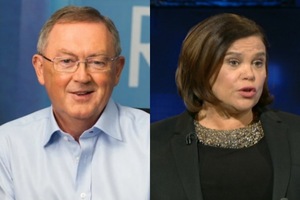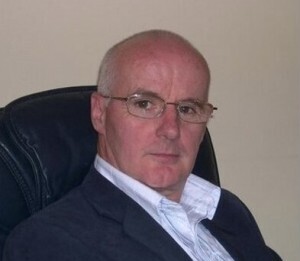

Clockwise from top left: Alison OConnor, Fionnan Sheahan, Sinn Féin leader Mary Lou McDonald and RTÉ’s Seán O’Rourke;
This morning.
On RTÉ Radio One’s Today with Seán O’Rourke.
Ireland editor of the Irish Independent Fionnan Sheahan, Irish Examiner columnist Alison O’Connor and RTÉ’s Niamh Lyons joined Mr O’Rourke to discuss last night’s leaders’ debate on RTÉ’s Prime Time.
The panel discussion followed Mr O’Rourke interviewing Breege Quinn about the murder of her 21-year-old son Paul Quinn in Monaghan in 2007, following comments made by Sinn Féin leader Mary Lou McDonald during last night’s debate.
During the interview with Ms Quinn, she said Sinn Féin’s Minister for Finance in the North Conor Murphy should resign or be stood down as minister.
Following this, Mr O’Rourke asked the panelists how the matter might effect the election “in the last three crucial days”.
Alison O’Connor: “Well I suppose, Seán. First of all, I mean, that Breege Quinn, I mean, what, I found myself really moved by her interview and almost close to tears at times. What she’s been through, her immense dignity and even where she said, at the end, two wrongs not making a right.
“There are a lot of people as we know who want to vote Sinn Féin in this election. People who would not have considered it before and it’s for understandable reasons because they say want change and they’re not expecting to get that change from Fianna Fáil and Fine Gael.
“But I think that, in a funny sort of a way, it’s this blowing up at this time is not a bad thing. Because this is part and parcel of Sinn Féin’s history and their past and that we see this playing out. People will be able to make, I believe, a fully informed choice.
“And in a way, it gets to the heart, I mean this is something that happened 13 years ago. And Mary Lou McDonald is implying, saying, whatever, that in that space of time and even in more recent times, I mean, it has come up, Mrs Quinn was on [RTÉ’s] Drivetime the other day as well, that she didn’t have either then, now or in the last couple of years a full conversation with Conor Murphy, a very senior member of her party, to see where exactly things stand.
“Either a) that just doesn’t have credibility or b) shockingly, it’s very far down the list of the party’s priorities. And I would also say, as someone who observes, has been observing politics for a long time, this is the bit that fascinates me. If Sinn Féin are in Government, in a coalition arrangement, and we’ll say that was actually an interview on Prime Time last night, and Mary Lou McDonald was a minister and she was asked that question by Miriam O’Callaghan and gave that unsatisfactory an answer, how that plays, how we’ll say the Fianna Fáil or Fine Gael side of the house would cope would that. And the fall-out from that sort of thing.
“And my final point as well then is, just watching it as a viewer last night, I thought Miriam O’Callaghan did magnificently with the questioning. Why didn’t Leo Varadkar and Micheál Martin, I thought, in terms of, just purely point scoring which it seems wrong to bring that level of it to this conversation, did not pile in, did not ask any questions?”
O’Rourke: “Well, perhaps because they felt dignity required and also the political reality, nothing needed to be said. Fionnan Sheahan, I suppose when it came to other aspects of law and order and the ugly side of our relatively recent history, the question of the Special Criminal Court was one that Mary Lou McDonald struggled on as well?”
Fionnan Sheahan: “Yeah you’re colleague Bryan Dobson has a three-question rule. He says on TV, when you ask somebody a question three times and they haven’t answered it, the viewer at home can quite clearly see ‘well, they’re not answering the question’. Miriam O’Callaghan went further, she asked the question four times and Mary Lou McDonald failed to answer that question about the Special Criminal Court.
“Sinn Féin’s position now is that they say they want to review the Special Criminal Court. They have opposed the Offences Against The State Act every time it has come up in the Dáil over the past generation which implies that they are opposed to the Special Criminal Court. So Mary Lou McDonald could not come out with a straight-forward [inaudible] last night, saying ‘I’m in favour of the Special Criminal Court’ which not only affects prosecutions of alleged members of a terrorist organisation but also is a key element of combatting gangland crime.
“So I mean, in effect, you are seeing in a situation like the murder of Paul Quinn, north of the border. However there are situations where is nigh impossible to get witnesses into the witness box and that’s why we…”
O’Rourke: “I suppose looking at this, Niamh Lyons, like all political change, sorry, like a lot of political change, it has to be done crab-like. That’s how they got to the ceasefire over a quarter of a century ago and it was interesting looking at Eoin Ó Broin on the Virgin Media analysis, the post-match analysis, he was saying, just by way of clarification on that, Sinn Féin, yes they want a review of the courts and they want it done by a senior judicial figure and they will accept the outcome. So if that recommendation is the Special Criminal Court stays, they’re happy for it to say.”
Niamh Lyons: “Yeah and there has been criticism of the Special Criminal Court by the likes of the Irish Council for Civil Liberties, Amnesty International. I think the issue here, for Mary Lou McDonald, is that she wanted to be front and centre in that debate last night. She put herself up there, playing the senior hurling but she wasn’t at the match at all.
“And this is where I suppose the rubber hits the road for her candidacy. You know, when you hear her, that accusation that, you know, who runs Sinn Féin? On that issue and the Special Criminal Court and on the issue of Paul Quinn, she’s unable to pivot in her own position and if you go on the Sinn Féin website, you’ll see a picture of Mary Lou, you’ll see Pearse Doherty, Michelle O’Neill and Conor Murphy.
“He’s one of the top four people in the party. He’s their lead negotiator. So why is she not allowed pivot away from something that he has previously said. You know, why is she so on the backfoot on this issue. Why does she sit down in front of Bryan Dobson, not knowing that not only had Conor Murphy made those claims but Gerry Adams in the past has made those claims. Why did she not check it out? Is she following a particular line?”
O’Connor: “I mean that’s the heart of it. This is a woman at the peak of her…this is a woman at the peak of her political powers right…”
Talk over each other
O’Rourke: ‘But is there a light-touch relationship with the truth? You know, I mean she, in this studio, sitting where Fionnan is sitting, she said she believed Gerry Adams when he said he wasn’t a member of the IRA.”
O’Connor: “Actually Seán, I’m trying to…she didn’t quite say that. She said something like ‘you accept’…because I remember hearing that interview, I’m trying to remember her wording now, it was a very particular wording and…of course the criminal court was going to come up. I’ve heard her address it previously in the campaign. Of course the Quinn story was going to come up. So I find it very interesting, I didn’t see Eoin Ó Broin last night.
“So Eoin Ó Broin, who’s of lesser standing, if you like, than the leader is able to say that Sinn Féin would accept the outcome of a review into the Special Criminal Court. So it gets back to the heart of that issue, where we wonder, who pulls the strings on these sorts of issues, the whole, as Micheál Martin calls it, the old provos issue and why Mary Lou McDonald doesn’t appear to have the absolute autonomy as party leader on these issues.”
O’Rourke: “Let’s move to another…”
Sheahan: “The issue I suppose is that: do people care?
O’Rourke: “Well…”
Talk over each other
O’Connor: “Yeah, that’s an interesting…”
Sheahan: “The calculation Sinn Féin will make now is ‘well, you know, how many people are going to know who Paul Quinn was and how it was that he died and how many people, the man on the street, is going to know who Conor Murphy is? And that’s all stuff north of the border’…”
O’Rourke: “Yes, and there are atrocities on all sides…”
Sheahan: “Yeah.”
O’Rourke: “And if you go back long enough into the history of all the parties, very bad things happened. Now let’s move to another aspect of this debate…”
Listen back in full here
Earlier: How Was It For You?













